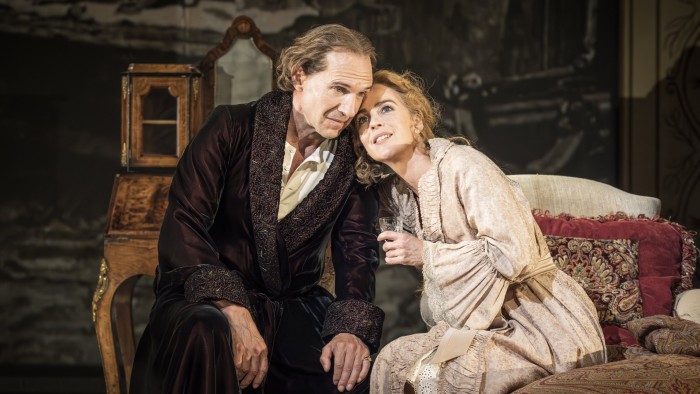Unlock the Editor’s Digest for free
Roula Khalaf, Editor of the FT, selects her favourite stories in this weekly newsletter.
“People arguing, that isn’t theatre,” blazes Ralph Fiennes’ Henry Irving — who, with nice irony, just happens to be mid-argument in a play full of them. In fact, David Hare’s new drama Grace Pervades is driven by some fundamental arguments — what is theatre for? What defines it, sustains it and why does it matter? It’s fascinating territory and Hare’s play is constantly absorbing, often funny and led by a mesmerising performance from Fiennes and a gorgeous, buoyant one from Miranda Raison. But it covers too much ground to do justice to its own potential.
Central to the debate are two giants of the Victorian stage: the great actor-manager Irving and his leading lady Ellen Terry (Raison). While Irving burns his life out in tireless dedication to his art and to running the Lyceum Theatre, the luminous Terry delivers natural, definitive performances yet hankers for something deeper. He strives to make theatre “respectable”, to give audiences big “proper” plays, like Macbeth; she longs to play leading parts and questions why they don’t tackle Ibsen, Shaw or Strindberg.
Terry’s two children, meanwhile, look to the future. Her pioneering daughter, Edith Craig, champions women’s causes, and produces 150 plays in 10 years. Her radical, difficult son Edward “Teddy” Gordon Craig has visions of redefining theatre completely but alienates colleagues. Between them all, they grapple with the changing nature of live theatre and ideas that will forge the art form we have today.
 A scene from David Hare’s ‘Grace Pervades’ © Marc Brenner
A scene from David Hare’s ‘Grace Pervades’ © Marc Brenner
Hare’s play slices back and forth in time and place, with Bob Crowley’s smart design using projections to shift location nimbly. We see Irving coax Terry to join him, touch in on their triumphs, watch as Irving, exhausted and frail, battles on despite illness. We drop in on Teddy being impossible in Moscow with Stanislavski. We visit Edith in Kent, living in a ménage à trois and hefting wood around to build a theatre with no class divisions.
Hare is affectionately funny on the craft of making theatre — the grind, the sweat, the dressing room doubts and rehearsal room rows — but he also touchingly pays tribute to the legacy that he and the company have inherited. Jeremy Herrin’s production embraces that: in a striking opening, the cast step out of a mist onto the empty stage as if summoned back to life. And, pleasingly, the work launches a season at Theatre Royal Bath with Fiennes himself as actor-manager (next up is As You Like It, which Irving wouldn’t produce).
All this is great. But the difficulty is that any one of these characters could merit a play of their own. Jordan Metcalfe is very funny as the pompous Teddy; Ruby Ashbourne Serkis is warmly likeable as the practical Edith. But we don’t get nearly close enough to either of them or grapple properly with their ideas. And their narratives pull us away from the main meat of the play, Irving and Terry.
The chemistry between these two is gripping, however. Raison brings grace and warmth to Terry — a foil to Fiennes’ pale, driven, impassioned Irving, who seems to be all elbows, knees and forehead and has the social skills of a plank. There’s a huge laugh when Raison’s Terry gently suggests that he try looking at other actors on stage. This richly packed play feels like rummaging around in a theatrical trunk — which is both its pleasure and its problem.
★★★☆☆
To July 19, theatreroyal.org.uk
